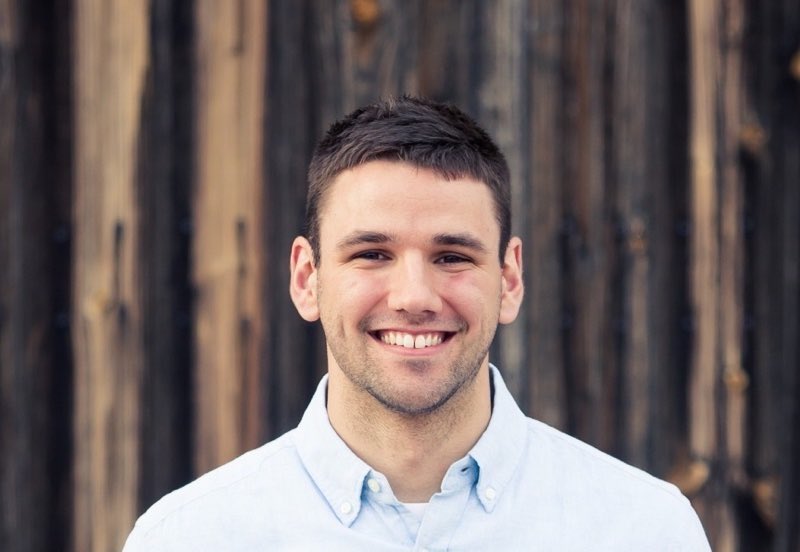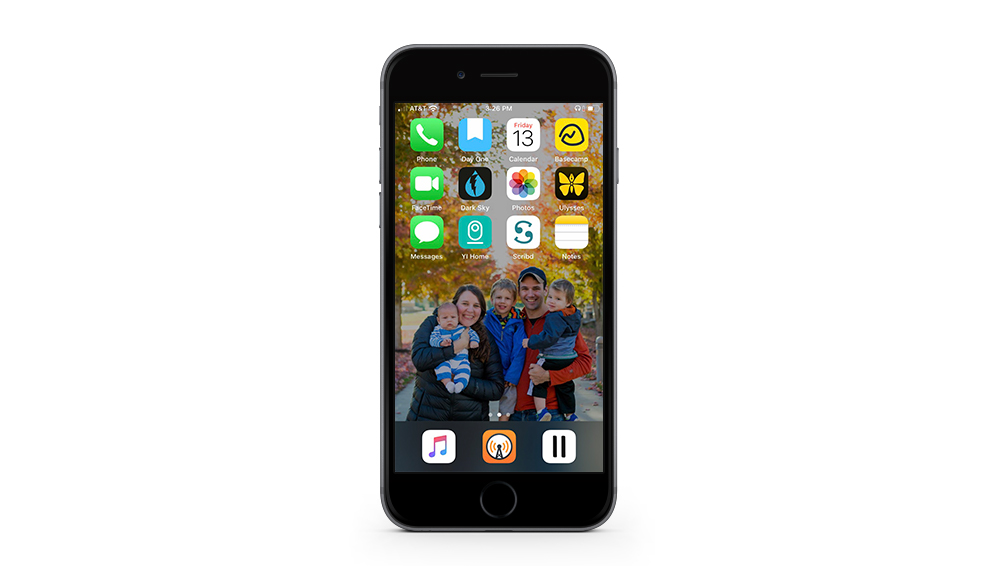How Isaac Smith Fights the Urge to Stay Connected
In this Mindfulness Monday post, we talk to Blanc Media Production Manager Isaac Smith about his intentional limitations, fighting the urge to stay connected, and his 6-month “dumb-phone” experiment.
Meet Isaac Smith
Isaac Smith is the Production Manager here at Blanc Media. He’s the organizer of the 30-day digital declutter that’s happening right now, and the one who shoots and edits most of the non-screencast videos you’ll see in our training courses here and on The Focus Course (our sister site).

He’s also a fellow coffee snob and did an experiment earlier this year where he switched back to a “dumb-phone” for six months. I remember visiting Isaac in the middle of the experiment, and knew we needed to talk to him someday about his intentional technology use.
Must-Have, Most-Used Apps for Thinkers
We spend an inordinate amount of time sorting through hundreds of apps to find the very best. Our team here at The Sweet Setup put together a short list of our must-have, most-used apps for writing, note-taking, and thinking.
What sort of boundaries or intentional constraints (i.e. rules) have you set up around how you use your technology?
Over the last few years, I’ve spent a lot of time thinking about how I can engage technology. I think reading Cal Newport’s book, Digital Minimalism last year provoked an even deeper skepticism toward new technologies. Not that I’m anti-technology, but I’ve come to question more deeply its role in my life. This thought that continued advances in technology correlates and leads to continued quality of life. The two are not indefinitely connected. This is something Dr. Richard Swenson talks about in his book Margin. The concept of progress does not always serve the limitations of the human experience. There comes a point in which we must challenge the role of progress in our life. All that to say, I’ve done a lot of thinking about the role of technology in my life as well as in our family.
When it comes to intentional limitations I’ve come up with a few.
Mobile Phone
- No Notifications: The only thing that makes my phone buzz or make noise is a phone call or text message. All other notifications are muted. Along a similar vein, I’ve disabled all badge icons and lock screen notifications. I’ve even disabled text messages from appearing on my lock screen.
- No social apps: ’nuff said.
- Car Use: Mobile phone usage while driving is restricted to phone calls, podcasts, audiobooks, or music. That’s it. If it’s not one of those things, there’s no reason I should be using my phone while driving.
Around the House
-
No Smartphones in the Bedroom: I don’t need to be reachable and/or connected to the outside world 24/7. One small step toward pulling back is removing smartphones from our bedroom.
-
Turn Off Phone: To continue to resist the urge and feeling like I need to have my phone within arms reach at all times, I’ve started turning my phone off starting Friday night around 7pm and keep it off throughout Saturday as long as possible.
I say as long as possible because there are scenarios where my wife and I are running around town and need to be able to reach each other.
-
Use other Tools: One of the reasons I got a record player was to not have to pick up my phone to play music. With the smartphone combining so many tools in one device, you end up picking it up for endless amounts of menial tasks. I’ve tried to find other ways to accomplish things around the house without having to use my smartphone, even if it is relatively inconvenient.
What does your phone home screen look like? How has the application of your intentional constraints shaped what shows up here?

I’m not sure that my home screen looks all that different from the next person. For me it’s a handful of subtle adjustments that have helped.
In the home screen dock, I’ve got Music, Overcast, and an app called One Minute Pause. These aren’t necessarily the apps I use the most, but definitely frequently.
Otherwise, my home screen includes Apple Notes, Ulysses, Basecamp, Scribd, Photos, Messages, Day One, Dark Sky, YI Home (Baby Monitor), and FaceTime.
I guess the intentionality here is apps that I use and are helpful, but that I don’t need to spend a lot of time in. Pretty much none of them are passive consumption apps.
The restraints are evidenced in what you won’t find, and that’s Safari, email, or any social apps.
As you apply intentionality to your use of technology, what are some examples of what you consider net-positive technology uses?
I appreciate things like FaceTime and getting to talk to my kids when I’m away from home. It’s pretty cool that my kids are able to talk to grandparents hundreds of miles away, to see their faces and hear their voices.
Honestly, a simple aspect of technology that is easily overlooked is the continuity between devices. The fact that I can jot down a note in Ulysses when inspiration strikes and then pick it up on my Mac later is still kind of amazing to me. It really wasn’t that long ago that our devices were silo’d.
What was your tipping point, the moment when you decided you needed to do something about your technology defaults?
I’m not sure there was a specific moment for me. I was raised in a family that put a strong emphasis on family participation. I’ve always been fascinated by technology and can remember very vividly my first Mac computer. But my parents did a good job reminding me and my siblings of the role of technology.
As an adult, I’ve always carried a reserved posture toward my tech usage. I guess I’m a little suspicious of any technology that would consume disproportionate amounts of my time or attention.
I have a smartphone, but I don’t really love it. Earlier this year I spent six months using a dumb-phone as an experiment, and I honestly miss it in some ways. Maybe I’ll do it again.
As you’ve changed your technology habits, what are some of the things you’ve had to learn to work around or live without?
The thing that comes to mind first is choosing boredom. Stimulation is one swipe away and it’s the last thing I need. The amount of information we are faced with on a daily basis is overwhelming. I do my best to take advantage of any opportunity to be bored.
I listen to little while driving, usually just silence. I’m a big runner, and most of the time I don’t listen to anything. Also, learning to leave my phone behind when going out if I’m with my wife. When home, I usually drop it on top of our pantry and leave it there unless I need it.
Something else I’ve tried to fight is the urge to look things up real quick. Meaning, if I have a thought, idea, or question that pops up while on the go, I think about it, but try to act as though I don’t have the internet in my pocket. This goes back to that boredom thing. Our brains need blank canvases to think and work out ideas. But if I interrupt my thinking process by whipping out my smartphone and diving into full blown research mode, something is lost.
I need to just muse and not be connected.
What app (or service) has the strongest pull towards getting you to go back to the way things were? And how do you deal with it?
Oh man, though I don’t have any social apps on my smartphone, Instagram has always been a black hole for me. For me, dealing with it is moderation and inconvenience. I’ve made the experience of Instagram pretty inconvenient and minimal. According to iOS screen time, I spend about 10 minutes on Instagram per day, which still feels like too much.
There are times I still catch myself mindlessly checking inboxes, more often than I’d care to admit, and this makes me want to burn it all to the ground. It’s these compulsions that software has reinforced that increases my dislike for technology.
How has implementing boundaries or intentional constraints positively impacted your life?
That’s difficult to say. Part of me feels as though if I didn’t live in the digital age of distraction we’re in, none of this would be a problem. So it kind of feels like these digital problems come with the territory of being alive right now. Which feels kind of sucky.
So I don’t know that I’d name it as a positive impact, but rather, what it takes to feel normal in such an overstimulated and overwhelming landscape of information. My attention is always being marketed.
For me, setting limitations on my technology use comes down to thinking clearly. I know there’s a direct correlation to the amount of time I spend on social tools and the baseline amount of internal noise and anxiety I feel.
I limit my technology use because it’s the only way my values stand a fighting chance.
What’s your best advice for the person who is trying to change how they use their technology to be more intentional?
Think about what you most value in life. What do you want to have achieved in your lifetime? What do you want to have passed on?
What role does technology play in supporting your values?
If a technology doesn’t support your value system — or worse, is at odds with your values — why are you using it?
Must-Have, Most-Used Apps for Thinkers
We spend an inordinate amount of time sorting through hundreds of apps to find the very best. Our team here at The Sweet Setup put together a short list of our must-have, most-used apps for writing, note-taking, and thinking.
